Analysis: Growing the Artificial Intelligence Industry in the UK
VerifiedAdded on 2023/03/23
|78
|31355
|82
Report
AI Summary
This report analyzes the Professor Dame Wendy Hall and Jérôme Pesenti review, which focuses on strategies for growing the Artificial Intelligence (AI) industry in the UK. It highlights the potential economic benefits of AI, aiming for the UK to become a global leader in AI development and deployment. The review emphasizes improving access to data through data trusts and making research data machine-readable, enhancing AI skills by sponsoring Masters programs and increasing PhD places, maximizing AI research through the Alan Turing Institute, and supporting AI uptake with an AI Council and clear guidance. The report's recommendations encompass government, industry, and academia working together to ensure the UK remains at the forefront of AI innovation and application across various sectors.
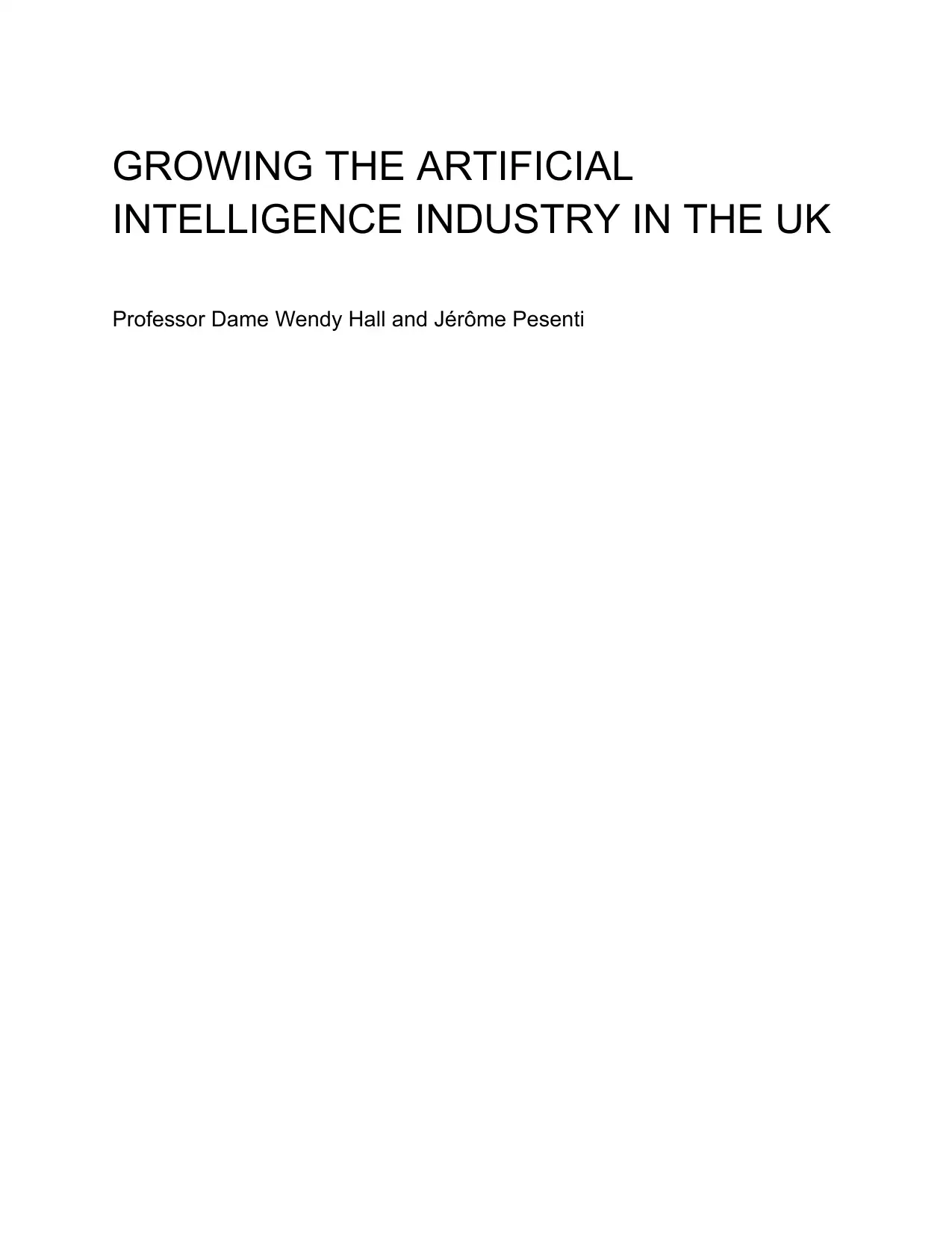
GROWING THE ARTIFICIAL
INTELLIGENCE INDUSTRY IN THE UK
Professor Dame Wendy Hall and Jérôme Pesenti
INTELLIGENCE INDUSTRY IN THE UK
Professor Dame Wendy Hall and Jérôme Pesenti
Paraphrase This Document
Need a fresh take? Get an instant paraphrase of this document with our AI Paraphraser

Growing the Artificial Intelligence Industry in the UK
1
FOREWORD
We are grateful to the Business Secretary and Culture Secretary for asking us to conduct this
Review of how to grow Artificial Intelligence in the UK, in terms of those developing it and
deploying it. We believe that this is the right time for the UK to accelerate on AI, and ensure that
our unique history of ground breaking research bears fruit in the social and economic benefits
that the technology offers.
We are at the threshold of an era when much of our productivity and prosperity will be derived
from the systems and machines we create. We are accustomed now to technology developing
fast, but that pace will increase and AI will drive much of that acceleration. The impacts on
society and the economy will be profound, although the exact nature of those impacts is
uncertain. We are convinced that because of the UK’s current and historical strengths in this
area we are in a strong position to lead rather than follow in both the development of the
technology and its deployment in all sectors of industry, education and government.
We have a choice. The UK could stay among the world leaders in AI in the future, or allow other
countries to dominate. We start from a good position in many respects but other leading
countries are devoting significant resources to growing and deploying AI. The UK will need to
act in key areas and to sustain action over a long period and across industry sectors, to retain
its world leading status, and to grow our AI capability as well as deploying it much more widely.
If we can judge by the contributions to this Review by academic and industry experts, the UK
has the expertise and the appetite to grasp the opportunity if we act decisively now.
We would like to thank everyone who helped us with this review. We consulted with a wide
range of experts and organisations but because the time we had to undertake the review was
relatively short, it was not possible to talk to everyone with valuable expertise and experience.
We hope that many more people and organisations will take part in developing and delivering
these recommendations to make the UK the best place in the world for AI companies to flourish
and deploy AI across all sectors of society for the benefit of all.
1
FOREWORD
We are grateful to the Business Secretary and Culture Secretary for asking us to conduct this
Review of how to grow Artificial Intelligence in the UK, in terms of those developing it and
deploying it. We believe that this is the right time for the UK to accelerate on AI, and ensure that
our unique history of ground breaking research bears fruit in the social and economic benefits
that the technology offers.
We are at the threshold of an era when much of our productivity and prosperity will be derived
from the systems and machines we create. We are accustomed now to technology developing
fast, but that pace will increase and AI will drive much of that acceleration. The impacts on
society and the economy will be profound, although the exact nature of those impacts is
uncertain. We are convinced that because of the UK’s current and historical strengths in this
area we are in a strong position to lead rather than follow in both the development of the
technology and its deployment in all sectors of industry, education and government.
We have a choice. The UK could stay among the world leaders in AI in the future, or allow other
countries to dominate. We start from a good position in many respects but other leading
countries are devoting significant resources to growing and deploying AI. The UK will need to
act in key areas and to sustain action over a long period and across industry sectors, to retain
its world leading status, and to grow our AI capability as well as deploying it much more widely.
If we can judge by the contributions to this Review by academic and industry experts, the UK
has the expertise and the appetite to grasp the opportunity if we act decisively now.
We would like to thank everyone who helped us with this review. We consulted with a wide
range of experts and organisations but because the time we had to undertake the review was
relatively short, it was not possible to talk to everyone with valuable expertise and experience.
We hope that many more people and organisations will take part in developing and delivering
these recommendations to make the UK the best place in the world for AI companies to flourish
and deploy AI across all sectors of society for the benefit of all.
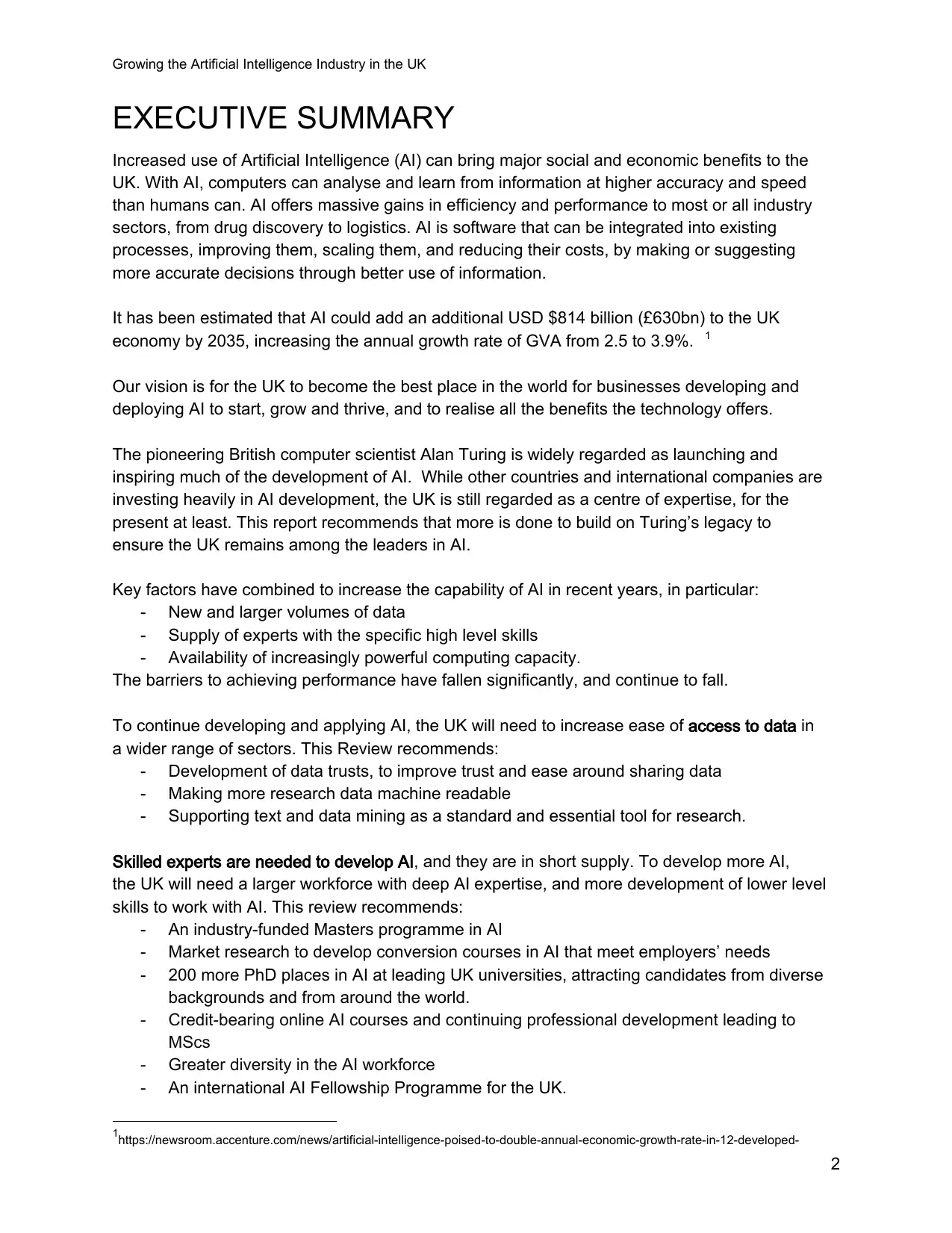
Growing the Artificial Intelligence Industry in the UK
2
EXECUTIVE SUMMARY
Increased use of Artificial Intelligence (AI) can bring major social and economic benefits to the
UK. With AI, computers can analyse and learn from information at higher accuracy and speed
than humans can. AI offers massive gains in efficiency and performance to most or all industry
sectors, from drug discovery to logistics. AI is software that can be integrated into existing
processes, improving them, scaling them, and reducing their costs, by making or suggesting
more accurate decisions through better use of information.
It has been estimated that AI could add an additional USD $814 billion (£630bn) to the UK
economy by 2035, increasing the annual growth rate of GVA from 2.5 to 3.9%. 1
Our vision is for the UK to become the best place in the world for businesses developing and
deploying AI to start, grow and thrive, and to realise all the benefits the technology offers.
The pioneering British computer scientist Alan Turing is widely regarded as launching and
inspiring much of the development of AI. While other countries and international companies are
investing heavily in AI development, the UK is still regarded as a centre of expertise, for the
present at least. This report recommends that more is done to build on Turing’s legacy to
ensure the UK remains among the leaders in AI.
Key factors have combined to increase the capability of AI in recent years, in particular:
- New and larger volumes of data
- Supply of experts with the specific high level skills
- Availability of increasingly powerful computing capacity.
The barriers to achieving performance have fallen significantly, and continue to fall.
To continue developing and applying AI, the UK will need to increase ease of access to data in
a wider range of sectors. This Review recommends:
- Development of data trusts, to improve trust and ease around sharing data
- Making more research data machine readable
- Supporting text and data mining as a standard and essential tool for research.
Skilled experts are needed to develop AI, and they are in short supply. To develop more AI,
the UK will need a larger workforce with deep AI expertise, and more development of lower level
skills to work with AI. This review recommends:
- An industry-funded Masters programme in AI
- Market research to develop conversion courses in AI that meet employers’ needs
- 200 more PhD places in AI at leading UK universities, attracting candidates from diverse
backgrounds and from around the world.
- Credit-bearing online AI courses and continuing professional development leading to
MScs
- Greater diversity in the AI workforce
- An international AI Fellowship Programme for the UK.
1https://newsroom.accenture.com/news/artificial-intelligence-poised-to-double-annual-economic-growth-rate-in-12-developed-
2
EXECUTIVE SUMMARY
Increased use of Artificial Intelligence (AI) can bring major social and economic benefits to the
UK. With AI, computers can analyse and learn from information at higher accuracy and speed
than humans can. AI offers massive gains in efficiency and performance to most or all industry
sectors, from drug discovery to logistics. AI is software that can be integrated into existing
processes, improving them, scaling them, and reducing their costs, by making or suggesting
more accurate decisions through better use of information.
It has been estimated that AI could add an additional USD $814 billion (£630bn) to the UK
economy by 2035, increasing the annual growth rate of GVA from 2.5 to 3.9%. 1
Our vision is for the UK to become the best place in the world for businesses developing and
deploying AI to start, grow and thrive, and to realise all the benefits the technology offers.
The pioneering British computer scientist Alan Turing is widely regarded as launching and
inspiring much of the development of AI. While other countries and international companies are
investing heavily in AI development, the UK is still regarded as a centre of expertise, for the
present at least. This report recommends that more is done to build on Turing’s legacy to
ensure the UK remains among the leaders in AI.
Key factors have combined to increase the capability of AI in recent years, in particular:
- New and larger volumes of data
- Supply of experts with the specific high level skills
- Availability of increasingly powerful computing capacity.
The barriers to achieving performance have fallen significantly, and continue to fall.
To continue developing and applying AI, the UK will need to increase ease of access to data in
a wider range of sectors. This Review recommends:
- Development of data trusts, to improve trust and ease around sharing data
- Making more research data machine readable
- Supporting text and data mining as a standard and essential tool for research.
Skilled experts are needed to develop AI, and they are in short supply. To develop more AI,
the UK will need a larger workforce with deep AI expertise, and more development of lower level
skills to work with AI. This review recommends:
- An industry-funded Masters programme in AI
- Market research to develop conversion courses in AI that meet employers’ needs
- 200 more PhD places in AI at leading UK universities, attracting candidates from diverse
backgrounds and from around the world.
- Credit-bearing online AI courses and continuing professional development leading to
MScs
- Greater diversity in the AI workforce
- An international AI Fellowship Programme for the UK.
1https://newsroom.accenture.com/news/artificial-intelligence-poised-to-double-annual-economic-growth-rate-in-12-developed-
⊘ This is a preview!⊘
Do you want full access?
Subscribe today to unlock all pages.

Trusted by 1+ million students worldwide
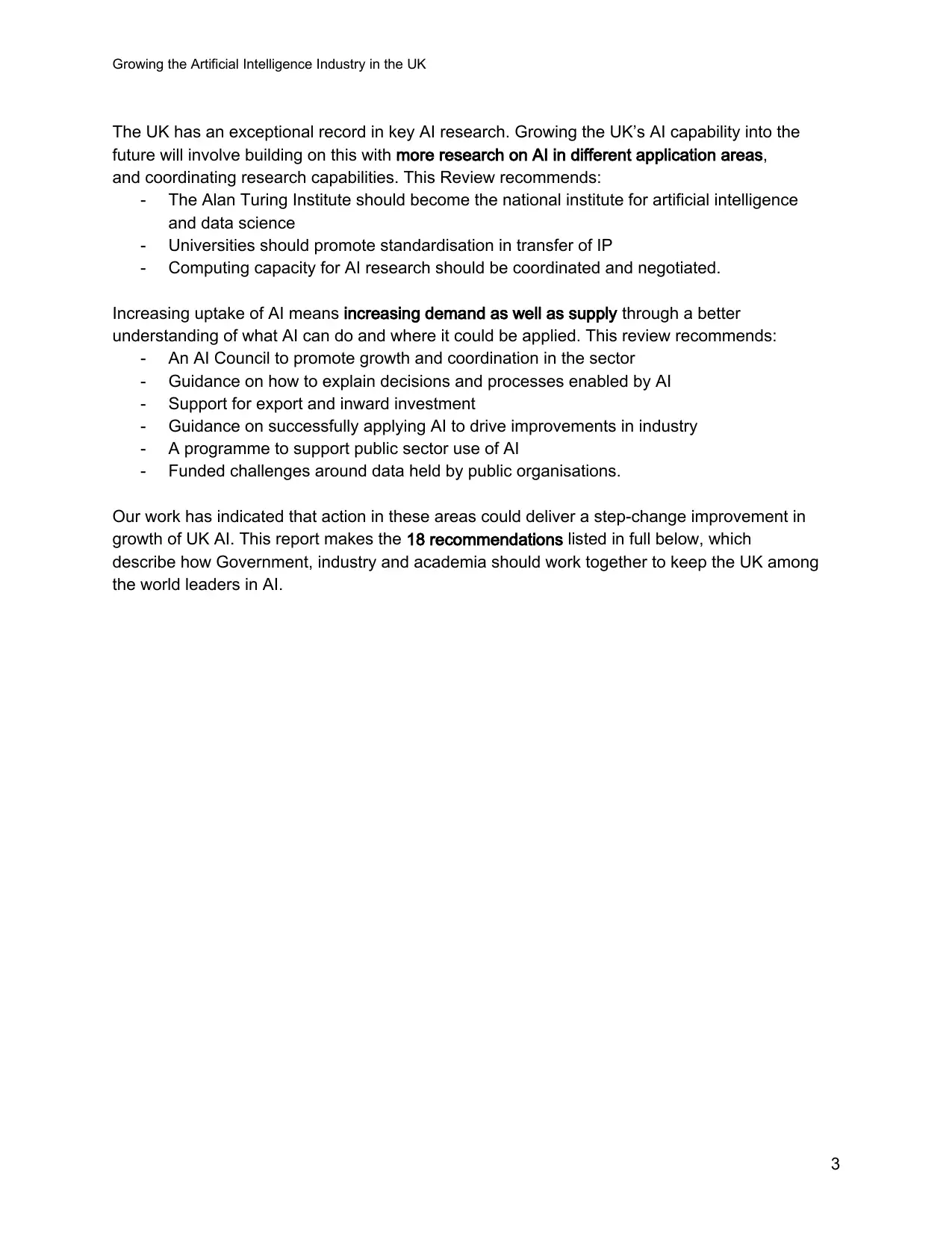
Growing the Artificial Intelligence Industry in the UK
3
The UK has an exceptional record in key AI research. Growing the UK’s AI capability into the
future will involve building on this with more research on AI in different application areas,
and coordinating research capabilities. This Review recommends:
- The Alan Turing Institute should become the national institute for artificial intelligence
and data science
- Universities should promote standardisation in transfer of IP
- Computing capacity for AI research should be coordinated and negotiated.
Increasing uptake of AI means increasing demand as well as supply through a better
understanding of what AI can do and where it could be applied. This review recommends:
- An AI Council to promote growth and coordination in the sector
- Guidance on how to explain decisions and processes enabled by AI
- Support for export and inward investment
- Guidance on successfully applying AI to drive improvements in industry
- A programme to support public sector use of AI
- Funded challenges around data held by public organisations.
Our work has indicated that action in these areas could deliver a step-change improvement in
growth of UK AI. This report makes the 18 recommendations listed in full below, which
describe how Government, industry and academia should work together to keep the UK among
the world leaders in AI.
3
The UK has an exceptional record in key AI research. Growing the UK’s AI capability into the
future will involve building on this with more research on AI in different application areas,
and coordinating research capabilities. This Review recommends:
- The Alan Turing Institute should become the national institute for artificial intelligence
and data science
- Universities should promote standardisation in transfer of IP
- Computing capacity for AI research should be coordinated and negotiated.
Increasing uptake of AI means increasing demand as well as supply through a better
understanding of what AI can do and where it could be applied. This review recommends:
- An AI Council to promote growth and coordination in the sector
- Guidance on how to explain decisions and processes enabled by AI
- Support for export and inward investment
- Guidance on successfully applying AI to drive improvements in industry
- A programme to support public sector use of AI
- Funded challenges around data held by public organisations.
Our work has indicated that action in these areas could deliver a step-change improvement in
growth of UK AI. This report makes the 18 recommendations listed in full below, which
describe how Government, industry and academia should work together to keep the UK among
the world leaders in AI.
Paraphrase This Document
Need a fresh take? Get an instant paraphrase of this document with our AI Paraphraser
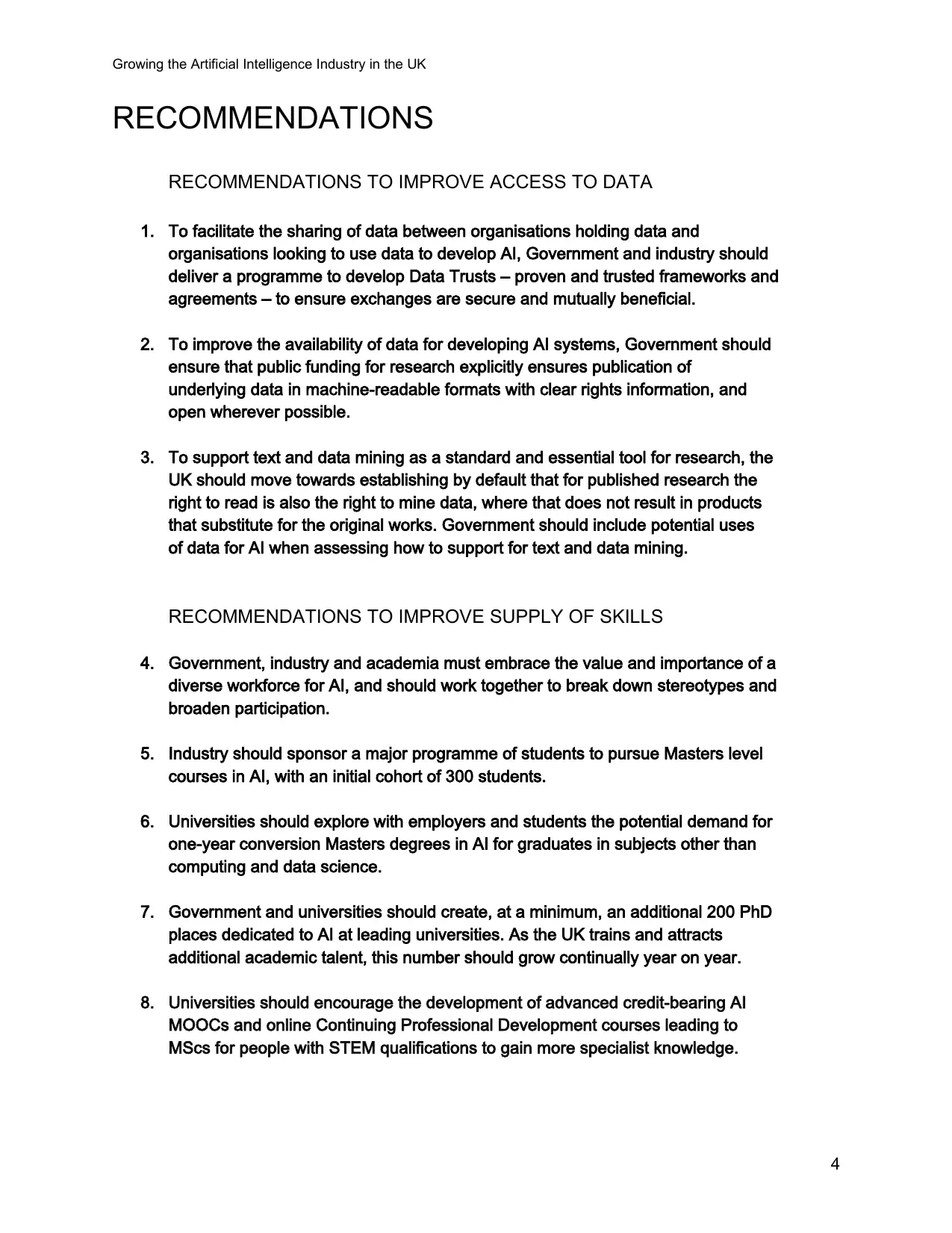
Growing the Artificial Intelligence Industry in the UK
4
RECOMMENDATIONS
RECOMMENDATIONS TO IMPROVE ACCESS TO DATA
1. To facilitate the sharing of data between organisations holding data and
organisations looking to use data to develop AI, Government and industry should
deliver a programme to develop Data Trusts – proven and trusted frameworks and
agreements – to ensure exchanges are secure and mutually beneficial.
2. To improve the availability of data for developing AI systems, Government should
ensure that public funding for research explicitly ensures publication of
underlying data in machine-readable formats with clear rights information, and
open wherever possible.
3. To support text and data mining as a standard and essential tool for research, the
UK should move towards establishing by default that for published research the
right to read is also the right to mine data, where that does not result in products
that substitute for the original works. Government should include potential uses
of data for AI when assessing how to support for text and data mining.
RECOMMENDATIONS TO IMPROVE SUPPLY OF SKILLS
4. Government, industry and academia must embrace the value and importance of a
diverse workforce for AI, and should work together to break down stereotypes and
broaden participation.
5. Industry should sponsor a major programme of students to pursue Masters level
courses in AI, with an initial cohort of 300 students.
6. Universities should explore with employers and students the potential demand for
one-year conversion Masters degrees in AI for graduates in subjects other than
computing and data science.
7. Government and universities should create, at a minimum, an additional 200 PhD
places dedicated to AI at leading universities. As the UK trains and attracts
additional academic talent, this number should grow continually year on year.
8. Universities should encourage the development of advanced credit-bearing AI
MOOCs and online Continuing Professional Development courses leading to
MScs for people with STEM qualifications to gain more specialist knowledge.
4
RECOMMENDATIONS
RECOMMENDATIONS TO IMPROVE ACCESS TO DATA
1. To facilitate the sharing of data between organisations holding data and
organisations looking to use data to develop AI, Government and industry should
deliver a programme to develop Data Trusts – proven and trusted frameworks and
agreements – to ensure exchanges are secure and mutually beneficial.
2. To improve the availability of data for developing AI systems, Government should
ensure that public funding for research explicitly ensures publication of
underlying data in machine-readable formats with clear rights information, and
open wherever possible.
3. To support text and data mining as a standard and essential tool for research, the
UK should move towards establishing by default that for published research the
right to read is also the right to mine data, where that does not result in products
that substitute for the original works. Government should include potential uses
of data for AI when assessing how to support for text and data mining.
RECOMMENDATIONS TO IMPROVE SUPPLY OF SKILLS
4. Government, industry and academia must embrace the value and importance of a
diverse workforce for AI, and should work together to break down stereotypes and
broaden participation.
5. Industry should sponsor a major programme of students to pursue Masters level
courses in AI, with an initial cohort of 300 students.
6. Universities should explore with employers and students the potential demand for
one-year conversion Masters degrees in AI for graduates in subjects other than
computing and data science.
7. Government and universities should create, at a minimum, an additional 200 PhD
places dedicated to AI at leading universities. As the UK trains and attracts
additional academic talent, this number should grow continually year on year.
8. Universities should encourage the development of advanced credit-bearing AI
MOOCs and online Continuing Professional Development courses leading to
MScs for people with STEM qualifications to gain more specialist knowledge.
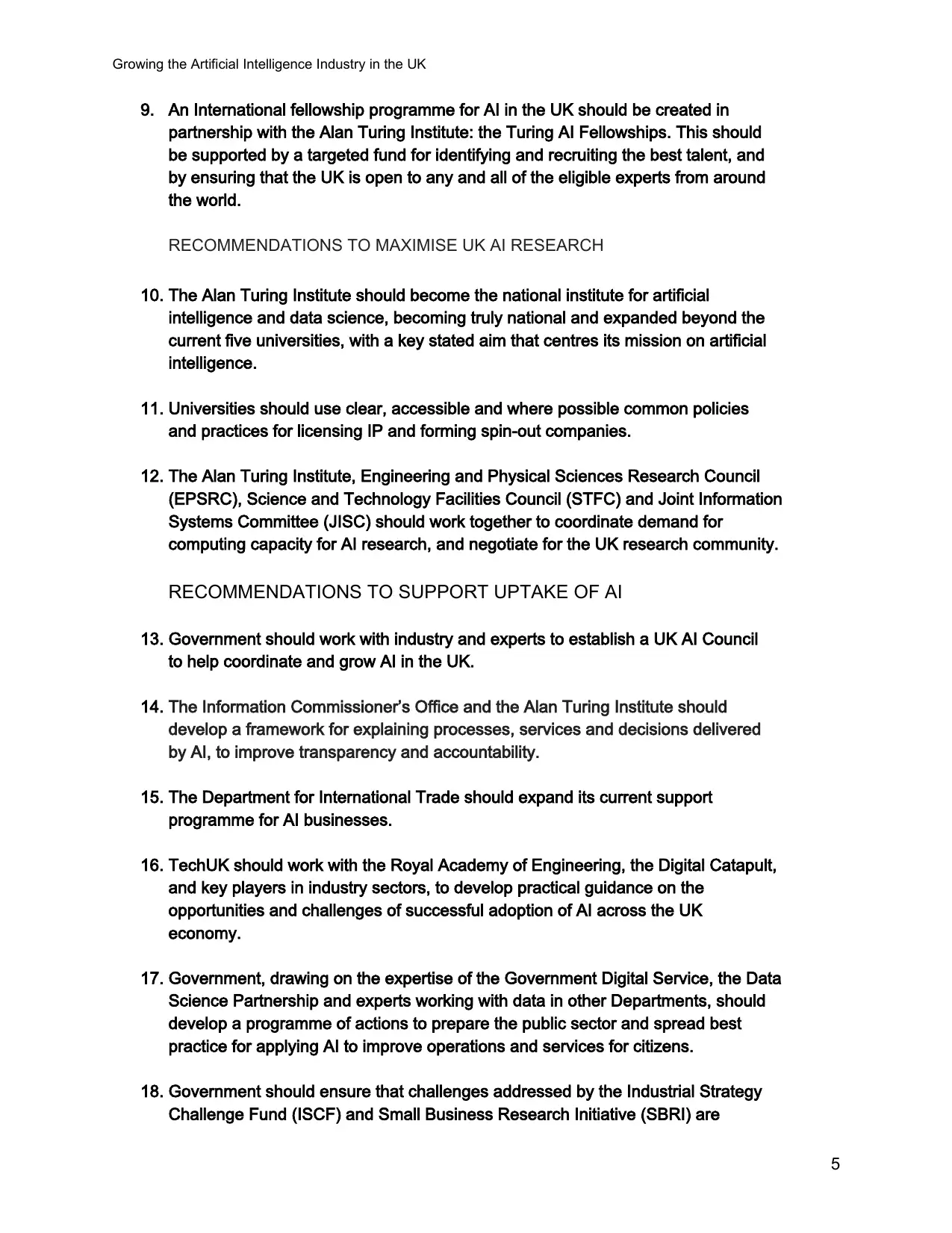
Growing the Artificial Intelligence Industry in the UK
5
9. An International fellowship programme for AI in the UK should be created in
partnership with the Alan Turing Institute: the Turing AI Fellowships. This should
be supported by a targeted fund for identifying and recruiting the best talent, and
by ensuring that the UK is open to any and all of the eligible experts from around
the world.
RECOMMENDATIONS TO MAXIMISE UK AI RESEARCH
10. The Alan Turing Institute should become the national institute for artificial
intelligence and data science, becoming truly national and expanded beyond the
current five universities, with a key stated aim that centres its mission on artificial
intelligence.
11. Universities should use clear, accessible and where possible common policies
and practices for licensing IP and forming spin-out companies.
12. The Alan Turing Institute, Engineering and Physical Sciences Research Council
(EPSRC), Science and Technology Facilities Council (STFC) and Joint Information
Systems Committee (JISC) should work together to coordinate demand for
computing capacity for AI research, and negotiate for the UK research community.
RECOMMENDATIONS TO SUPPORT UPTAKE OF AI
13. Government should work with industry and experts to establish a UK AI Council
to help coordinate and grow AI in the UK.
14. The Information Commissioner’s Office and the Alan Turing Institute should
develop a framework for explaining processes, services and decisions delivered
by AI, to improve transparency and accountability.
15. The Department for International Trade should expand its current support
programme for AI businesses.
16. TechUK should work with the Royal Academy of Engineering, the Digital Catapult,
and key players in industry sectors, to develop practical guidance on the
opportunities and challenges of successful adoption of AI across the UK
economy.
17. Government, drawing on the expertise of the Government Digital Service, the Data
Science Partnership and experts working with data in other Departments, should
develop a programme of actions to prepare the public sector and spread best
practice for applying AI to improve operations and services for citizens.
18. Government should ensure that challenges addressed by the Industrial Strategy
Challenge Fund (ISCF) and Small Business Research Initiative (SBRI) are
5
9. An International fellowship programme for AI in the UK should be created in
partnership with the Alan Turing Institute: the Turing AI Fellowships. This should
be supported by a targeted fund for identifying and recruiting the best talent, and
by ensuring that the UK is open to any and all of the eligible experts from around
the world.
RECOMMENDATIONS TO MAXIMISE UK AI RESEARCH
10. The Alan Turing Institute should become the national institute for artificial
intelligence and data science, becoming truly national and expanded beyond the
current five universities, with a key stated aim that centres its mission on artificial
intelligence.
11. Universities should use clear, accessible and where possible common policies
and practices for licensing IP and forming spin-out companies.
12. The Alan Turing Institute, Engineering and Physical Sciences Research Council
(EPSRC), Science and Technology Facilities Council (STFC) and Joint Information
Systems Committee (JISC) should work together to coordinate demand for
computing capacity for AI research, and negotiate for the UK research community.
RECOMMENDATIONS TO SUPPORT UPTAKE OF AI
13. Government should work with industry and experts to establish a UK AI Council
to help coordinate and grow AI in the UK.
14. The Information Commissioner’s Office and the Alan Turing Institute should
develop a framework for explaining processes, services and decisions delivered
by AI, to improve transparency and accountability.
15. The Department for International Trade should expand its current support
programme for AI businesses.
16. TechUK should work with the Royal Academy of Engineering, the Digital Catapult,
and key players in industry sectors, to develop practical guidance on the
opportunities and challenges of successful adoption of AI across the UK
economy.
17. Government, drawing on the expertise of the Government Digital Service, the Data
Science Partnership and experts working with data in other Departments, should
develop a programme of actions to prepare the public sector and spread best
practice for applying AI to improve operations and services for citizens.
18. Government should ensure that challenges addressed by the Industrial Strategy
Challenge Fund (ISCF) and Small Business Research Initiative (SBRI) are
⊘ This is a preview!⊘
Do you want full access?
Subscribe today to unlock all pages.

Trusted by 1+ million students worldwide

Growing the Artificial Intelligence Industry in the UK
6
designed to attract and support applications of AI across the full range of
challenge areas and set funded challenges which use public sector data for AI.
6
designed to attract and support applications of AI across the full range of
challenge areas and set funded challenges which use public sector data for AI.
Paraphrase This Document
Need a fresh take? Get an instant paraphrase of this document with our AI Paraphraser
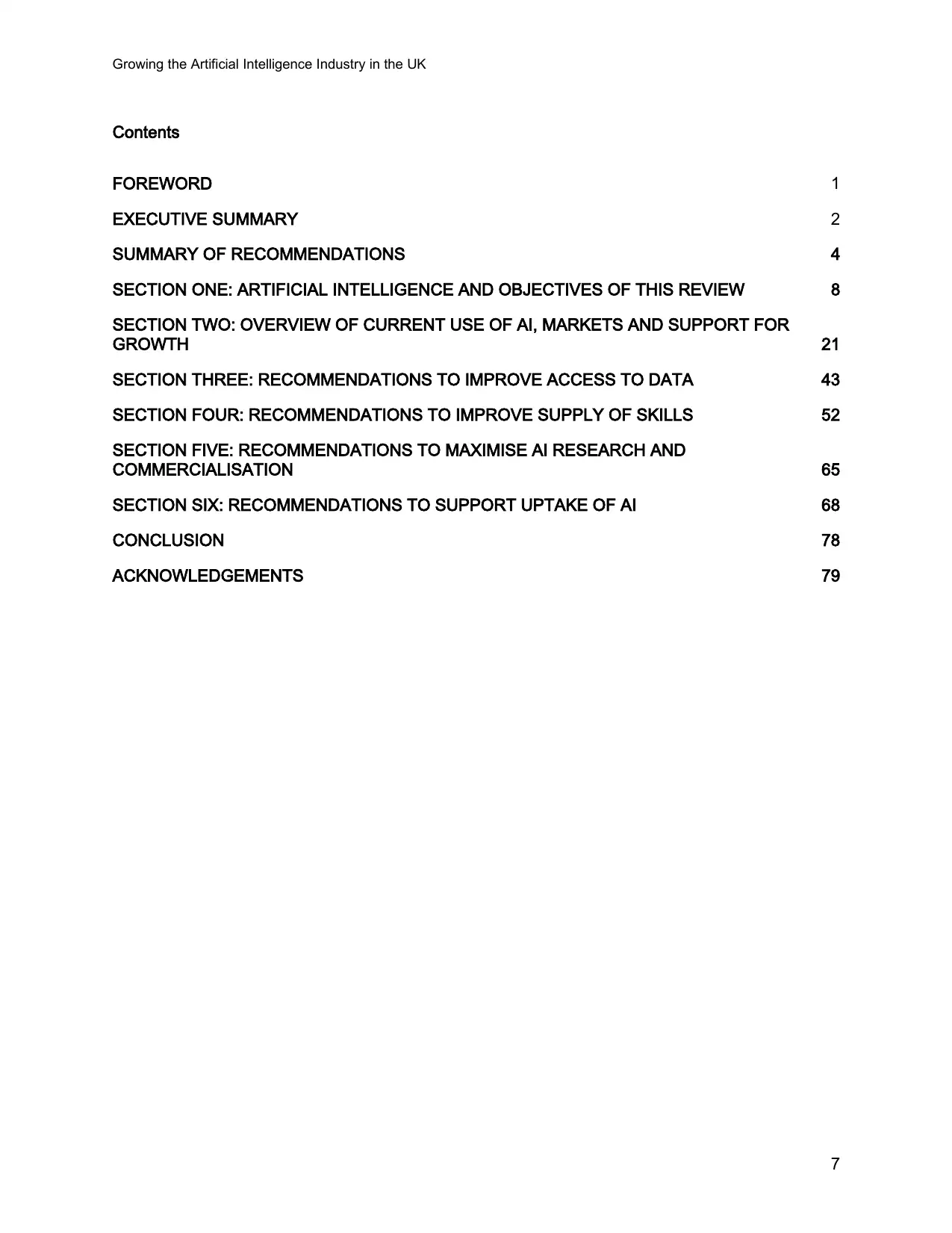
Growing the Artificial Intelligence Industry in the UK
7
Contents
FOREWORD 1
EXECUTIVE SUMMARY 2
SUMMARY OF RECOMMENDATIONS 4
SECTION ONE: ARTIFICIAL INTELLIGENCE AND OBJECTIVES OF THIS REVIEW 8
SECTION TWO: OVERVIEW OF CURRENT USE OF AI, MARKETS AND SUPPORT FOR
GROWTH 21
SECTION THREE: RECOMMENDATIONS TO IMPROVE ACCESS TO DATA 43
SECTION FOUR: RECOMMENDATIONS TO IMPROVE SUPPLY OF SKILLS 52
SECTION FIVE: RECOMMENDATIONS TO MAXIMISE AI RESEARCH AND
COMMERCIALISATION 65
SECTION SIX: RECOMMENDATIONS TO SUPPORT UPTAKE OF AI 68
CONCLUSION 78
ACKNOWLEDGEMENTS 79
7
Contents
FOREWORD 1
EXECUTIVE SUMMARY 2
SUMMARY OF RECOMMENDATIONS 4
SECTION ONE: ARTIFICIAL INTELLIGENCE AND OBJECTIVES OF THIS REVIEW 8
SECTION TWO: OVERVIEW OF CURRENT USE OF AI, MARKETS AND SUPPORT FOR
GROWTH 21
SECTION THREE: RECOMMENDATIONS TO IMPROVE ACCESS TO DATA 43
SECTION FOUR: RECOMMENDATIONS TO IMPROVE SUPPLY OF SKILLS 52
SECTION FIVE: RECOMMENDATIONS TO MAXIMISE AI RESEARCH AND
COMMERCIALISATION 65
SECTION SIX: RECOMMENDATIONS TO SUPPORT UPTAKE OF AI 68
CONCLUSION 78
ACKNOWLEDGEMENTS 79
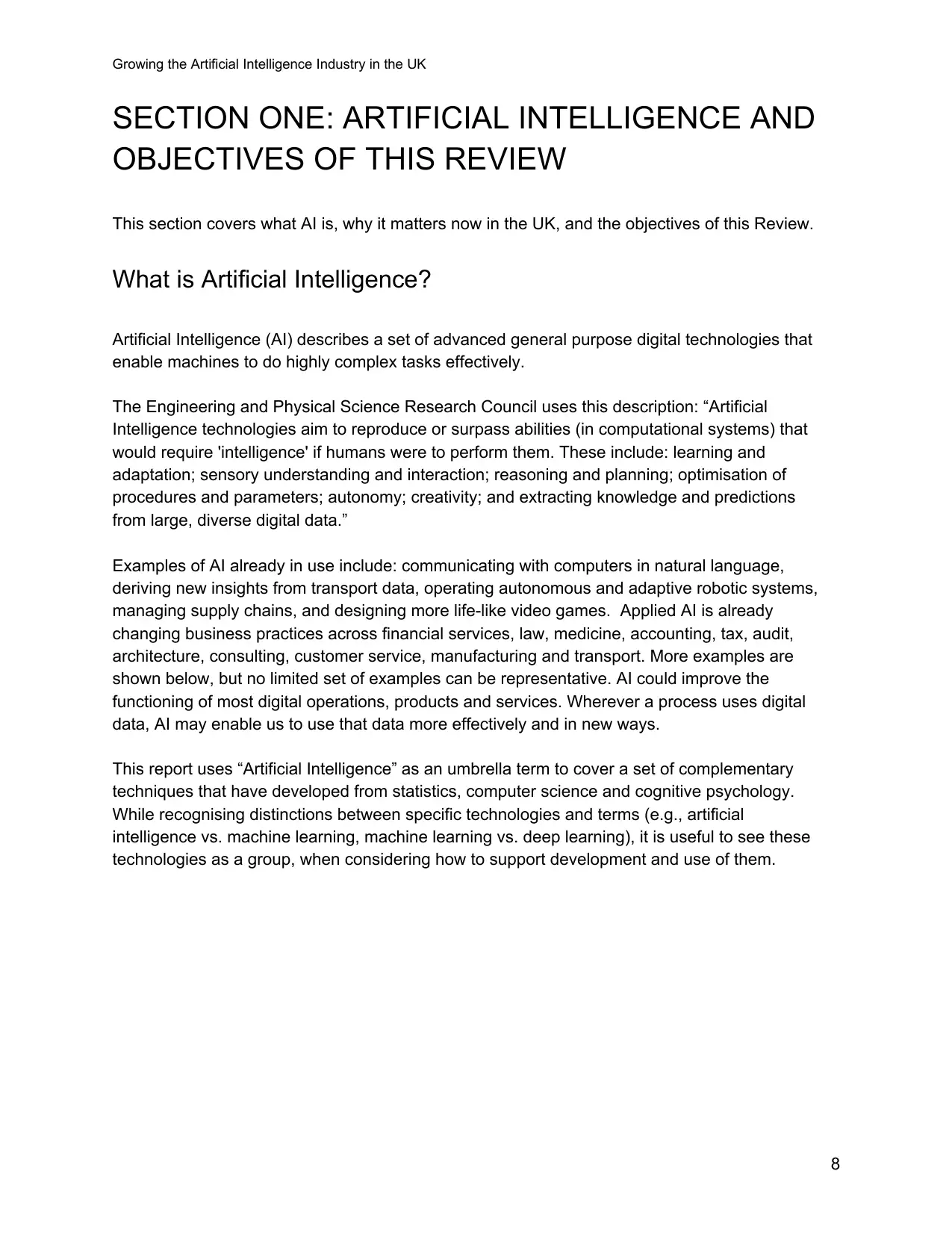
Growing the Artificial Intelligence Industry in the UK
8
SECTION ONE: ARTIFICIAL INTELLIGENCE AND
OBJECTIVES OF THIS REVIEW
This section covers what AI is, why it matters now in the UK, and the objectives of this Review.
What is Artificial Intelligence?
Artificial Intelligence (AI) describes a set of advanced general purpose digital technologies that
enable machines to do highly complex tasks effectively.
The Engineering and Physical Science Research Council uses this description: “Artificial
Intelligence technologies aim to reproduce or surpass abilities (in computational systems) that
would require 'intelligence' if humans were to perform them. These include: learning and
adaptation; sensory understanding and interaction; reasoning and planning; optimisation of
procedures and parameters; autonomy; creativity; and extracting knowledge and predictions
from large, diverse digital data.”
Examples of AI already in use include: communicating with computers in natural language,
deriving new insights from transport data, operating autonomous and adaptive robotic systems,
managing supply chains, and designing more life-like video games. Applied AI is already
changing business practices across financial services, law, medicine, accounting, tax, audit,
architecture, consulting, customer service, manufacturing and transport. More examples are
shown below, but no limited set of examples can be representative. AI could improve the
functioning of most digital operations, products and services. Wherever a process uses digital
data, AI may enable us to use that data more effectively and in new ways.
This report uses “Artificial Intelligence” as an umbrella term to cover a set of complementary
techniques that have developed from statistics, computer science and cognitive psychology.
While recognising distinctions between specific technologies and terms (e.g., artificial
intelligence vs. machine learning, machine learning vs. deep learning), it is useful to see these
technologies as a group, when considering how to support development and use of them.
8
SECTION ONE: ARTIFICIAL INTELLIGENCE AND
OBJECTIVES OF THIS REVIEW
This section covers what AI is, why it matters now in the UK, and the objectives of this Review.
What is Artificial Intelligence?
Artificial Intelligence (AI) describes a set of advanced general purpose digital technologies that
enable machines to do highly complex tasks effectively.
The Engineering and Physical Science Research Council uses this description: “Artificial
Intelligence technologies aim to reproduce or surpass abilities (in computational systems) that
would require 'intelligence' if humans were to perform them. These include: learning and
adaptation; sensory understanding and interaction; reasoning and planning; optimisation of
procedures and parameters; autonomy; creativity; and extracting knowledge and predictions
from large, diverse digital data.”
Examples of AI already in use include: communicating with computers in natural language,
deriving new insights from transport data, operating autonomous and adaptive robotic systems,
managing supply chains, and designing more life-like video games. Applied AI is already
changing business practices across financial services, law, medicine, accounting, tax, audit,
architecture, consulting, customer service, manufacturing and transport. More examples are
shown below, but no limited set of examples can be representative. AI could improve the
functioning of most digital operations, products and services. Wherever a process uses digital
data, AI may enable us to use that data more effectively and in new ways.
This report uses “Artificial Intelligence” as an umbrella term to cover a set of complementary
techniques that have developed from statistics, computer science and cognitive psychology.
While recognising distinctions between specific technologies and terms (e.g., artificial
intelligence vs. machine learning, machine learning vs. deep learning), it is useful to see these
technologies as a group, when considering how to support development and use of them.
⊘ This is a preview!⊘
Do you want full access?
Subscribe today to unlock all pages.

Trusted by 1+ million students worldwide
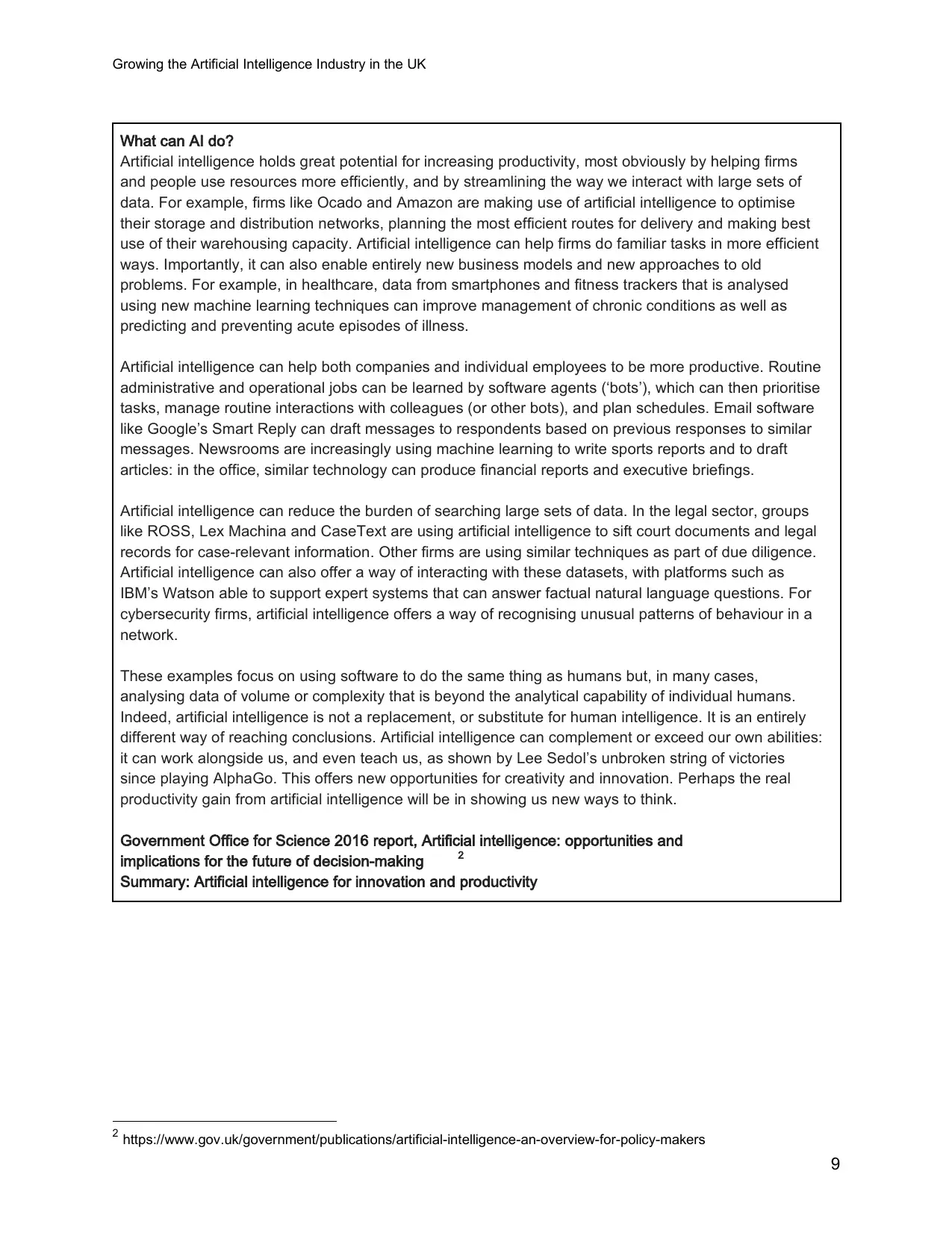
Growing the Artificial Intelligence Industry in the UK
9
What can AI do?
Artificial intelligence holds great potential for increasing productivity, most obviously by helping firms
and people use resources more efficiently, and by streamlining the way we interact with large sets of
data. For example, firms like Ocado and Amazon are making use of artificial intelligence to optimise
their storage and distribution networks, planning the most efficient routes for delivery and making best
use of their warehousing capacity. Artificial intelligence can help firms do familiar tasks in more efficient
ways. Importantly, it can also enable entirely new business models and new approaches to old
problems. For example, in healthcare, data from smartphones and fitness trackers that is analysed
using new machine learning techniques can improve management of chronic conditions as well as
predicting and preventing acute episodes of illness.
Artificial intelligence can help both companies and individual employees to be more productive. Routine
administrative and operational jobs can be learned by software agents (‘bots’), which can then prioritise
tasks, manage routine interactions with colleagues (or other bots), and plan schedules. Email software
like Google’s Smart Reply can draft messages to respondents based on previous responses to similar
messages. Newsrooms are increasingly using machine learning to write sports reports and to draft
articles: in the office, similar technology can produce financial reports and executive briefings.
Artificial intelligence can reduce the burden of searching large sets of data. In the legal sector, groups
like ROSS, Lex Machina and CaseText are using artificial intelligence to sift court documents and legal
records for case-relevant information. Other firms are using similar techniques as part of due diligence.
Artificial intelligence can also offer a way of interacting with these datasets, with platforms such as
IBM’s Watson able to support expert systems that can answer factual natural language questions. For
cybersecurity firms, artificial intelligence offers a way of recognising unusual patterns of behaviour in a
network.
These examples focus on using software to do the same thing as humans but, in many cases,
analysing data of volume or complexity that is beyond the analytical capability of individual humans.
Indeed, artificial intelligence is not a replacement, or substitute for human intelligence. It is an entirely
different way of reaching conclusions. Artificial intelligence can complement or exceed our own abilities:
it can work alongside us, and even teach us, as shown by Lee Sedol’s unbroken string of victories
since playing AlphaGo. This offers new opportunities for creativity and innovation. Perhaps the real
productivity gain from artificial intelligence will be in showing us new ways to think.
Government Office for Science 2016 report, Artificial intelligence: opportunities and
implications for the future of decision-making 2
Summary: Artificial intelligence for innovation and productivity
2 https://www.gov.uk/government/publications/artificial-intelligence-an-overview-for-policy-makers
9
What can AI do?
Artificial intelligence holds great potential for increasing productivity, most obviously by helping firms
and people use resources more efficiently, and by streamlining the way we interact with large sets of
data. For example, firms like Ocado and Amazon are making use of artificial intelligence to optimise
their storage and distribution networks, planning the most efficient routes for delivery and making best
use of their warehousing capacity. Artificial intelligence can help firms do familiar tasks in more efficient
ways. Importantly, it can also enable entirely new business models and new approaches to old
problems. For example, in healthcare, data from smartphones and fitness trackers that is analysed
using new machine learning techniques can improve management of chronic conditions as well as
predicting and preventing acute episodes of illness.
Artificial intelligence can help both companies and individual employees to be more productive. Routine
administrative and operational jobs can be learned by software agents (‘bots’), which can then prioritise
tasks, manage routine interactions with colleagues (or other bots), and plan schedules. Email software
like Google’s Smart Reply can draft messages to respondents based on previous responses to similar
messages. Newsrooms are increasingly using machine learning to write sports reports and to draft
articles: in the office, similar technology can produce financial reports and executive briefings.
Artificial intelligence can reduce the burden of searching large sets of data. In the legal sector, groups
like ROSS, Lex Machina and CaseText are using artificial intelligence to sift court documents and legal
records for case-relevant information. Other firms are using similar techniques as part of due diligence.
Artificial intelligence can also offer a way of interacting with these datasets, with platforms such as
IBM’s Watson able to support expert systems that can answer factual natural language questions. For
cybersecurity firms, artificial intelligence offers a way of recognising unusual patterns of behaviour in a
network.
These examples focus on using software to do the same thing as humans but, in many cases,
analysing data of volume or complexity that is beyond the analytical capability of individual humans.
Indeed, artificial intelligence is not a replacement, or substitute for human intelligence. It is an entirely
different way of reaching conclusions. Artificial intelligence can complement or exceed our own abilities:
it can work alongside us, and even teach us, as shown by Lee Sedol’s unbroken string of victories
since playing AlphaGo. This offers new opportunities for creativity and innovation. Perhaps the real
productivity gain from artificial intelligence will be in showing us new ways to think.
Government Office for Science 2016 report, Artificial intelligence: opportunities and
implications for the future of decision-making 2
Summary: Artificial intelligence for innovation and productivity
2 https://www.gov.uk/government/publications/artificial-intelligence-an-overview-for-policy-makers
Paraphrase This Document
Need a fresh take? Get an instant paraphrase of this document with our AI Paraphraser
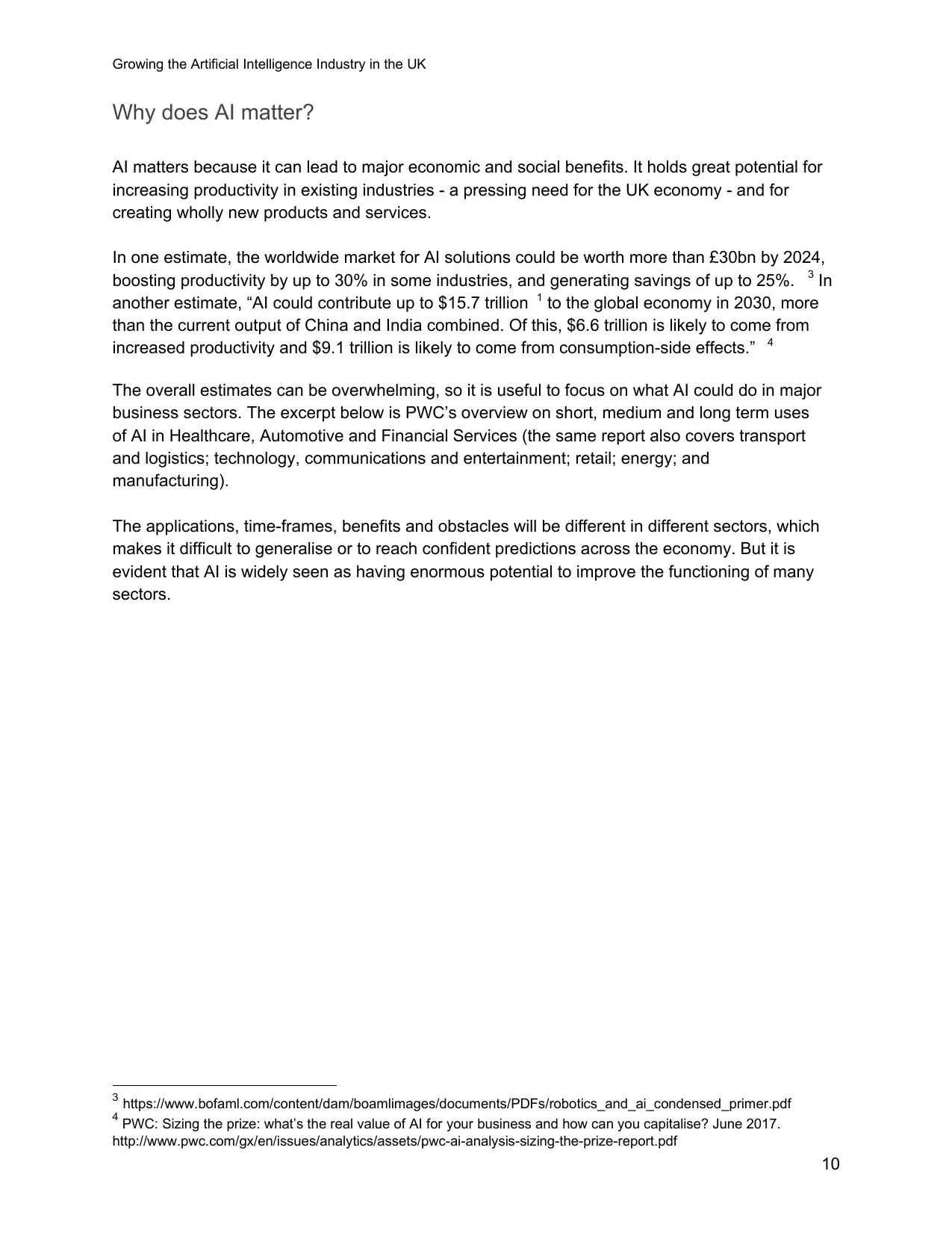
Growing the Artificial Intelligence Industry in the UK
10
Why does AI matter?
AI matters because it can lead to major economic and social benefits. It holds great potential for
increasing productivity in existing industries - a pressing need for the UK economy - and for
creating wholly new products and services.
In one estimate, the worldwide market for AI solutions could be worth more than £30bn by 2024,
boosting productivity by up to 30% in some industries, and generating savings of up to 25%. 3 In
another estimate, “AI could contribute up to $15.7 trillion 1 to the global economy in 2030, more
than the current output of China and India combined. Of this, $6.6 trillion is likely to come from
increased productivity and $9.1 trillion is likely to come from consumption-side effects.” 4
The overall estimates can be overwhelming, so it is useful to focus on what AI could do in major
business sectors. The excerpt below is PWC’s overview on short, medium and long term uses
of AI in Healthcare, Automotive and Financial Services (the same report also covers transport
and logistics; technology, communications and entertainment; retail; energy; and
manufacturing).
The applications, time-frames, benefits and obstacles will be different in different sectors, which
makes it difficult to generalise or to reach confident predictions across the economy. But it is
evident that AI is widely seen as having enormous potential to improve the functioning of many
sectors.
3 https://www.bofaml.com/content/dam/boamlimages/documents/PDFs/robotics_and_ai_condensed_primer.pdf
4 PWC: Sizing the prize: what’s the real value of AI for your business and how can you capitalise? June 2017.
http://www.pwc.com/gx/en/issues/analytics/assets/pwc-ai-analysis-sizing-the-prize-report.pdf
10
Why does AI matter?
AI matters because it can lead to major economic and social benefits. It holds great potential for
increasing productivity in existing industries - a pressing need for the UK economy - and for
creating wholly new products and services.
In one estimate, the worldwide market for AI solutions could be worth more than £30bn by 2024,
boosting productivity by up to 30% in some industries, and generating savings of up to 25%. 3 In
another estimate, “AI could contribute up to $15.7 trillion 1 to the global economy in 2030, more
than the current output of China and India combined. Of this, $6.6 trillion is likely to come from
increased productivity and $9.1 trillion is likely to come from consumption-side effects.” 4
The overall estimates can be overwhelming, so it is useful to focus on what AI could do in major
business sectors. The excerpt below is PWC’s overview on short, medium and long term uses
of AI in Healthcare, Automotive and Financial Services (the same report also covers transport
and logistics; technology, communications and entertainment; retail; energy; and
manufacturing).
The applications, time-frames, benefits and obstacles will be different in different sectors, which
makes it difficult to generalise or to reach confident predictions across the economy. But it is
evident that AI is widely seen as having enormous potential to improve the functioning of many
sectors.
3 https://www.bofaml.com/content/dam/boamlimages/documents/PDFs/robotics_and_ai_condensed_primer.pdf
4 PWC: Sizing the prize: what’s the real value of AI for your business and how can you capitalise? June 2017.
http://www.pwc.com/gx/en/issues/analytics/assets/pwc-ai-analysis-sizing-the-prize-report.pdf
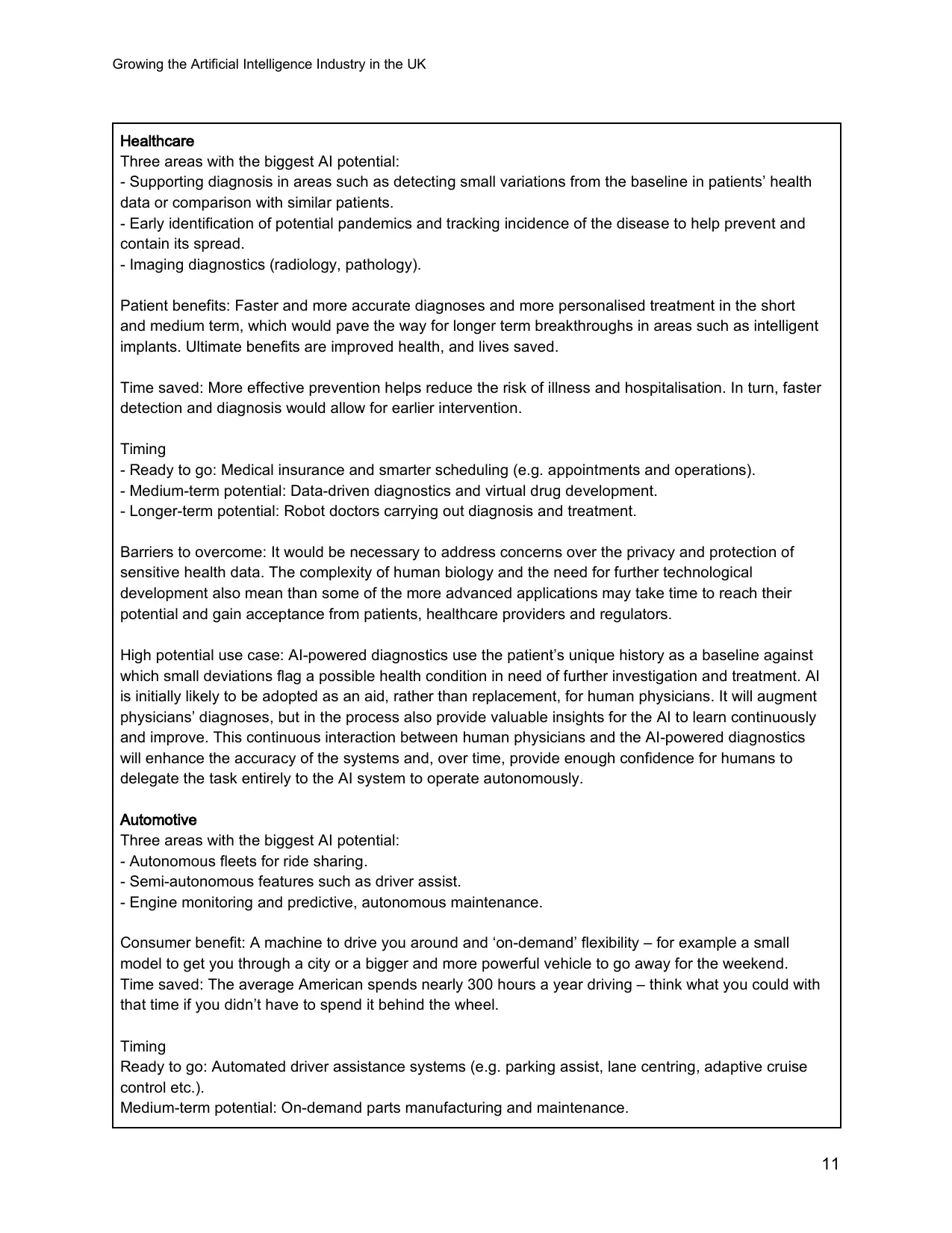
Growing the Artificial Intelligence Industry in the UK
11
Healthcare
Three areas with the biggest AI potential:
- Supporting diagnosis in areas such as detecting small variations from the baseline in patients’ health
data or comparison with similar patients.
- Early identification of potential pandemics and tracking incidence of the disease to help prevent and
contain its spread.
- Imaging diagnostics (radiology, pathology).
Patient benefits: Faster and more accurate diagnoses and more personalised treatment in the short
and medium term, which would pave the way for longer term breakthroughs in areas such as intelligent
implants. Ultimate benefits are improved health, and lives saved.
Time saved: More effective prevention helps reduce the risk of illness and hospitalisation. In turn, faster
detection and diagnosis would allow for earlier intervention.
Timing
- Ready to go: Medical insurance and smarter scheduling (e.g. appointments and operations).
- Medium-term potential: Data-driven diagnostics and virtual drug development.
- Longer-term potential: Robot doctors carrying out diagnosis and treatment.
Barriers to overcome: It would be necessary to address concerns over the privacy and protection of
sensitive health data. The complexity of human biology and the need for further technological
development also mean than some of the more advanced applications may take time to reach their
potential and gain acceptance from patients, healthcare providers and regulators.
High potential use case: AI-powered diagnostics use the patient’s unique history as a baseline against
which small deviations flag a possible health condition in need of further investigation and treatment. AI
is initially likely to be adopted as an aid, rather than replacement, for human physicians. It will augment
physicians’ diagnoses, but in the process also provide valuable insights for the AI to learn continuously
and improve. This continuous interaction between human physicians and the AI-powered diagnostics
will enhance the accuracy of the systems and, over time, provide enough confidence for humans to
delegate the task entirely to the AI system to operate autonomously.
Automotive
Three areas with the biggest AI potential:
- Autonomous fleets for ride sharing.
- Semi-autonomous features such as driver assist.
- Engine monitoring and predictive, autonomous maintenance.
Consumer benefit: A machine to drive you around and ‘on-demand’ flexibility – for example a small
model to get you through a city or a bigger and more powerful vehicle to go away for the weekend.
Time saved: The average American spends nearly 300 hours a year driving – think what you could with
that time if you didn’t have to spend it behind the wheel.
Timing
Ready to go: Automated driver assistance systems (e.g. parking assist, lane centring, adaptive cruise
control etc.).
Medium-term potential: On-demand parts manufacturing and maintenance.
11
Healthcare
Three areas with the biggest AI potential:
- Supporting diagnosis in areas such as detecting small variations from the baseline in patients’ health
data or comparison with similar patients.
- Early identification of potential pandemics and tracking incidence of the disease to help prevent and
contain its spread.
- Imaging diagnostics (radiology, pathology).
Patient benefits: Faster and more accurate diagnoses and more personalised treatment in the short
and medium term, which would pave the way for longer term breakthroughs in areas such as intelligent
implants. Ultimate benefits are improved health, and lives saved.
Time saved: More effective prevention helps reduce the risk of illness and hospitalisation. In turn, faster
detection and diagnosis would allow for earlier intervention.
Timing
- Ready to go: Medical insurance and smarter scheduling (e.g. appointments and operations).
- Medium-term potential: Data-driven diagnostics and virtual drug development.
- Longer-term potential: Robot doctors carrying out diagnosis and treatment.
Barriers to overcome: It would be necessary to address concerns over the privacy and protection of
sensitive health data. The complexity of human biology and the need for further technological
development also mean than some of the more advanced applications may take time to reach their
potential and gain acceptance from patients, healthcare providers and regulators.
High potential use case: AI-powered diagnostics use the patient’s unique history as a baseline against
which small deviations flag a possible health condition in need of further investigation and treatment. AI
is initially likely to be adopted as an aid, rather than replacement, for human physicians. It will augment
physicians’ diagnoses, but in the process also provide valuable insights for the AI to learn continuously
and improve. This continuous interaction between human physicians and the AI-powered diagnostics
will enhance the accuracy of the systems and, over time, provide enough confidence for humans to
delegate the task entirely to the AI system to operate autonomously.
Automotive
Three areas with the biggest AI potential:
- Autonomous fleets for ride sharing.
- Semi-autonomous features such as driver assist.
- Engine monitoring and predictive, autonomous maintenance.
Consumer benefit: A machine to drive you around and ‘on-demand’ flexibility – for example a small
model to get you through a city or a bigger and more powerful vehicle to go away for the weekend.
Time saved: The average American spends nearly 300 hours a year driving – think what you could with
that time if you didn’t have to spend it behind the wheel.
Timing
Ready to go: Automated driver assistance systems (e.g. parking assist, lane centring, adaptive cruise
control etc.).
Medium-term potential: On-demand parts manufacturing and maintenance.
⊘ This is a preview!⊘
Do you want full access?
Subscribe today to unlock all pages.

Trusted by 1+ million students worldwide
1 out of 78
Related Documents
Your All-in-One AI-Powered Toolkit for Academic Success.
+13062052269
info@desklib.com
Available 24*7 on WhatsApp / Email
![[object Object]](/_next/static/media/star-bottom.7253800d.svg)
Unlock your academic potential
Copyright © 2020–2025 A2Z Services. All Rights Reserved. Developed and managed by ZUCOL.





